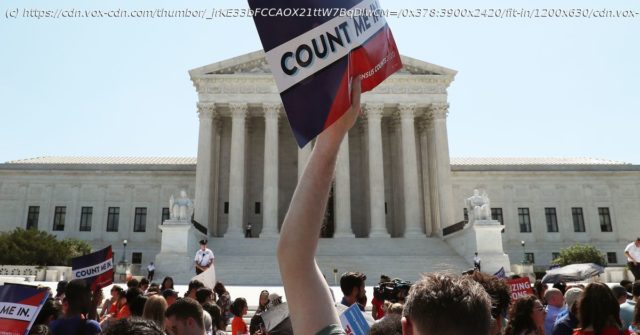Moore v. Harper is a test of whether this Supreme Court can ever be trusted with power.
The opening brief in Moore v. Harper, an extraordinarily high-stakes election case that the Supreme Court will hear December 7, is one of the least persuasive documents that I’ve ever read in any context. And I’ve read both Ayn Rand’s Atlas Shrugged, and Donald Trump’s Art of the Deal.
Moore is also potentially the biggest threat to free and fair elections in the United States to reach the Supreme Court in my lifetime — and I was alive for Bush v. Gore. Four justices have endorsed the utterly nonsensical legal theory underlying Moore, which means that, unless one of those four has second thoughts, the future of US elections will be decided by Trump-appointed Justice Amy Coney Barrett.
To be fair, enough conservative elites have now denounced this lawsuit that there is a real chance some of their ideological allies on the Court will have second thoughts. But the fact that any judge might embrace this nonsensical legal theory is absurd.
The case involves the awkwardly named “independent state legislature doctrine” (ISLD), a theory that the Supreme Court rejected many times over the course of more than a century. It’s also a theory repudiated by many of the very same sources that the ISLD proponents rely upon in their briefs to the justices.
Under the strongest form of this doctrine, members of each state’s legislative branch have unchecked authority to decide how elections for Congress and the presidency will be conducted in their state — indeed, a state legislature could potentially pass a law canceling the presidential election in that state and awarding its electoral votes to Donald Trump. Any state constitutional provisions that protect the right to vote, that limit gerrymandering, or that otherwise constrain lawmakers’ ability to skew elections would cease to function. State governors would lose their ability to veto laws impacting federal elections. And state courts would lose their authority to strike down these laws.
As Justice Neil Gorsuch wrote in a 2020 concurring opinion endorsing the ISLD, “the Constitution provides that state legislatures — not federal judges, not state judges, not state governors, not other state officials — bear primary responsibility for setting election rules.” Notably, this opinion was joined by Justice Brett Kavanaugh, who currently sits at the conservative Supreme Court’s ideological center.
In fairness, the petitioners in Moore (in Supreme Court parlance, the term “petitioner” typically refers to the party that lost in the court below) take a slightly less extreme position than Gorsuch and Kavanaugh. For example, these petitioners, Republican lawmakers in North Carolina who object to a state supreme court decision striking down gerrymandered congressional maps, do not ask the Court to overrule Smiley v. Holm (1932), which held that state governors may exercise their veto power over election legislation.
But the Moore petitioners nonetheless seek sweeping and radical changes to some of the most foundational principles of US election law. They argue that state constitutions “may not impose substantive state-constitutional limits” on laws governing federal elections, an argument that also precludes state courts from striking down election laws that violate such limits. In practice, their theory would also make the Supreme Court, where Republican appointees control two-thirds of the seats, the final word on disputes arising under state election law (currently, state supreme courts have the final say on all questions of state law).
An array of conservative luminaries filed briefs practically begging the Supreme Court not to do any of this. Foremost among them is J. Michael Luttig, a former federal judge who was on the cutting edge of legal conservatism in the Clinton and George W. Bush administrations.
Then there’s an amicus brief signed by Steven Calabresi, a founder of the conservative Federalist Society and the co-chair of its board, warning that the Moore petitioners “flout core tenets of the American Founding.” A brief by Benjamin Ginsberg, for many years the Republican Party’s top election lawyer, warns that the ISLD would “create untenable legal uncertainty around elections” and “increase the odds that state legislatures replace the popular vote with their own political preferences.” A brief on behalf of retired admirals, generals, and service secretaries — some of whom held high-level political appointments in Republican administrations — warns that the ISLD “undermines election integrity and exacerbates both domestic and foreign threats to national security.”
Let me be explicit about just how weak the arguments are supporting the independent state legislature doctrine: Any judge who, after reading the briefs in this case, concludes that the ISLD has merit is either too incompetent to practice law or too blinded by ideology to sit on any court. This entire case turns on the Moore petitioners’ inability to understand a dictionary
The ISLD is one of those legal arguments that, if I can borrow some choice words from the late Justice Antonin Scalia, periodically rises “like some ghoul in a late night horror movie that repeatedly sits up in its grave and shuffles abroad, after being repeatedly killed and buried.”
The Court first rejected it in Davis v. Hildebrant (1916), which upheld a provision of the Ohio constitution permitting the people of the state to veto state election laws via a popular referendum — even though that meant blocking a law enacted by the state’s legislative branch. It rejected the ISLD again in Smiley, the 1932 case holding that governors may veto election laws. The Court most recently rejected it in Arizona State Legislature v. Arizona Independent Redistricting Commission (2015), which held that states may use a bipartisan commission to draw congressional maps.
It’s likely that this particular ghoul refuses to die because the independent state legislature doctrine actually sounds plausible if you read the text of the Constitution without doing any legal or historical research, or even bothering to pick up a dictionary to see how a particularly important word is defined.
Start
United States
USA — mix The deranged Supreme Court case that threatens US democracy, explained






